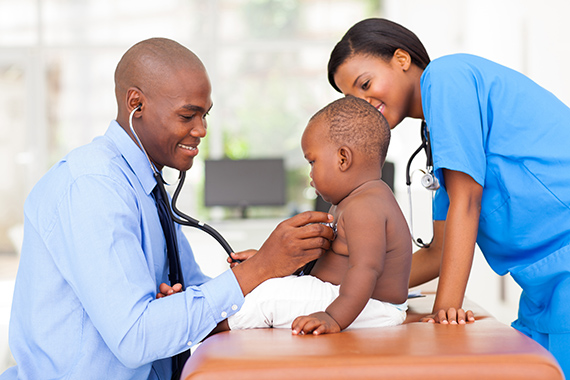
Newborns are referred to as babies in their first month of life. Noticeable changes occur in your baby in the five major areas of development.
- Physical development. Watching your baby grow in size is part of the fun for any parent. However, your baby may lose some weight shortly after birth. Do not be alarmed as this is not unusual. The lost weight is usually regained within 10 to 12 days. Most newborns gain about 113g to 227g a week and grow about 2.5 cm to 3.5 cm in the first month. However,
- Cognitive development. Interaction with your baby is most essential in promoting a healthy brain growth for your baby. Cognition is the ability to think, learn, and remember. Infant cognitive development is the study of how psychological processes involved in thinking and knowing develop in young children. Your newborn's brain develops rapidly when you interact in a positive way with him/her.
- Emotional and social development. Newborns quickly learn to communicate. They seek interaction with you and express how they feel with sounds and facial expressions. At first, instinctual behaviors, such as crying when uncomfortable, are your baby's ways to signal his or her needs. Soon your newborn starts to subtly communicate and interact with you. For example, your baby's eyes will track your movements. And his or her face will brighten when you cuddle and talk soothingly. Even at a few days old, your baby may try to mimic you sticking out your tongue.
- Language development. Your newborn is listening to and absorbing the basic and distinct sounds of language. To help, sing and talk to your baby often, but also keep other distracting background noises (the TV, radio) to a minimum so he/she can hear and focus on the sounds he/she’s working on. This process forms the foundation for speech.
- Sensory and motor skills development. Newborns have all five senses. Your newborn quickly learns to recognize your face, the sound of your voice, and how you smell. Your newborn's sense of touch is especially developed, particularly around the mouth. Your baby also has a strong sense of smell. After a few days, your newborn hears fairly well and responds most noticeably to high-pitched and loud sounds. Your baby recognizes and prefers sweet tastes to those that are sour, bitter, or salty. Vision is developing quickly but is believed to be the weakest of the senses. Motor skills (An action that involves your baby using his muscles. Gross motor skills are larger movements your baby makes with his arms, legs, feet, or his entire body. So crawling, running, and jumping are gross motor skills) develop as your baby's muscles and nerves work together. Movements are mostly controlled by reflexes, such as the rooting reflex, which is when a newborn's head turns and his or her mouth "reaches" toward a touch. Hands are tightly fisted when the baby is alert.
How can you help your newborn grow and develop?
Communication is the most important way to help your baby grow and develop. You can do this by using a high-pitched voice, gentle touch, hugs, and kisses. An environment that is rich in stimulation, comfort, and loving attention enhances many areas of a baby's development. Research shows that babies who are talked to throughout their first few years usually learn language skills more easily than those who are not. Newborns are more interested in their caregivers than they are in toys or other objects.
Source:
http://www.webmd.com/parenting/baby/tc/growth-and-development-newborn-topic-overview

